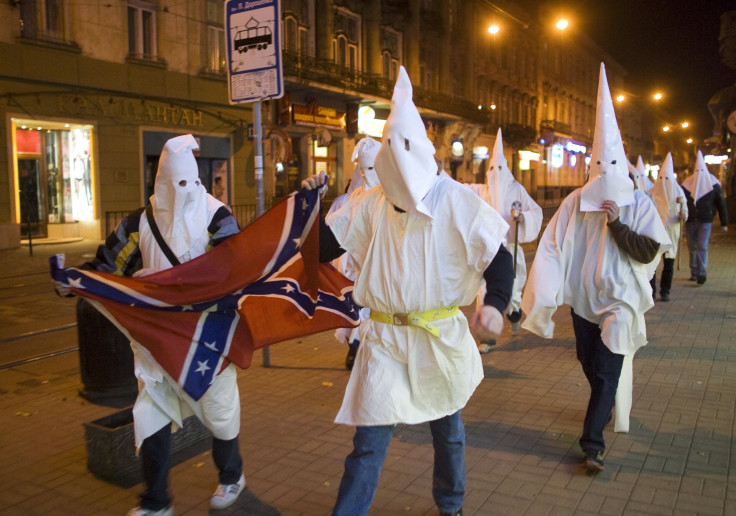For Hate Groups Like The KKK, Social Media Is A Double-Edged Sword

Spreading hate speech just isn’t as easy as it used to be as a Missouri chapter of the Ku Klux Klan found out when, after threatening Ferguson protesters with violence, its website was knocked offline. For that the Klan can thank the Anonymous hacking collective, which also took control of the KKK’s social media presence and claimed to leak personal information about members of the white supremacist group.
The hack, which began late Sunday and ran into Monday, comes as the latest sign of heightened tension in Ferguson, Missouri, where a grand jury is expected to announce this week whether Officer Darren Wilson will be indicted for fatally shooting Mike Brown, an unarmed 18-year-old African-American.
Yet the KKK's attempt to publicly involve itself in the case highlights how social media -- so adept at spreading some messages -- is a double-edged sword for hate groups. While the Internet can give anyone -- including ISIS and the KKK -- a megaphone, it can also mark them as targets. And as they broadcast information the rest of the world finds abhorrent, they're finding more voice results in less influence.
“The Internet gives these groups more of a voice. There’s no question about that,” said Mark Potok, a senior fellow at the Southern Poverty Law Center and the editor of the award-winning Intelligence Report journal. “Whether it actually gives them more influence is highly debatable. The vast majority of people, as they learn about these groups, are turned off by them.”
The KKK, which during the civil rights movement had a membership estimated at a half-million under a single unifying banner, has dwindled into an array of bickering tribes with a combined total of no more than about 5,000 followers.
Increased connectivity has failed to deliver for Klansmen, who have traditionally believed that, if it wasn’t for liberal newspaper editors who stifled the KKK’s message, the wider population would flock to the white supremacy cause.
“What’s turned out to be the case is that hate groups use the Internet in a way that’s essentially the same for anyone else: If the content doesn’t change, the readership is very low,” Potok said. “With that said it does give people within the movement a sense that there is a movement. Whereas 20 years ago your average Klansmen is a very isolated individual, he now wakes up, goes onto forums and reads emails about black men raping white women.”
Still, the Anonymous hacking collective was angry enough with the Traditionalist American Knights of the KKK’s letter threatening “lethal force” against Ferguson protesters to un-hood alleged members of the group, posting names, addresses and phone numbers online while also knocking multiple sites offline and taking control of the @KuKluxKlanUSA Twitter feed.
16 NOV 2014 09:11:47 You should've expected us. #OpKKK continues to be a success. Freedom will prevail. pic.twitter.com/FUrNzBpVOa
- Ku Klux Klan (@KuKluxKlanUSA) Nov. 16, 2014We are continuing to read Anonymous threats with much amusement. Still no action taken. #Cowards #HoodsON
- Ku Klux Klan (@KuKluxKlanUSA) Nov. 16, 2014“We want the KKK gone, forever,” said one member of Anonymous, adding that, despite previously misidentifying the officer who fatally shot Brown, the group is careful to not post details on the wrong people. “Don’t worry, we know what we’re doing ... we do loads of research.”
Another member suggested that even though subverting the KKK’s Internet presence will likely do nothing to eliminate the white supremacist group, “they will act stupidly and we will punish them.”
None of the names Anonymous leaked could be independently verified as members of Missouri’s Traditionalist American Knights of the KKK, though Potok said the very threat of being publicly identified as a member of the far right group could be enough for potential members to shy away. That mentality stands in stark contrast to the Klan of two generations ago when members could guarantee that their identity would remain a secret by simply donning a white hood.
“I do think this outing of individuals is important. It certainly scares a lot of people away from joining these groups,” Potok said. “I think anonymity is very important to the vast majority of followers. The reality is these people hold jobs and they might lose them if they’re identified.”
© Copyright IBTimes 2024. All rights reserved.











